英语口语情景对话 ppt课件
小学英语对话教学ppt课件(共41张精选PPT)

physical response(全部动作反应法),教材中的let`s do
部分内容都适合此方法。
▪ 热身活动的目的是创设英语学习氛围,激发学生学习英语的兴趣,
以旧带新,为新课学习做铺垫。因此选用的歌曲、Let’s do、
chant等内容最好与新授内容有关。如:对话中涉及到颜色,在热
成学习任务。
▪ 小学英语新课程标准
常见的小学英语对话教学模式
▪ 1. 导人话题 感知对话文本 分段突破 解读
对话文本 实际运用 提升对话文本的课堂教学模式。
▪ 2. 热身活动—新知呈现—巩固联系—拓展应用—评价检测教学模式。
▪ 3. 热身活动---呈现新知---句型操练---巩固操练---拓展应用---评
生帮助老人过马路的情景,或者设计一个男学生帮助一
个女学生搬桌子的情景,来进行语言的拓展训练。
▪ (2)直接进行话题对话
这种话题最直接,也最真实,最具交际性。教师只需直接给出某
个话题,例如,
“Holiday(假日)”、“Shopping(购物)”、“My favorite book(我喜欢的一
mechanical practice
Meaningful practice
3. 小学英语对话教学的话题设计
对话材料的分类
▪ 对话文本大致可分为情景型、结构型和信息型三大类型
▪ 情景型对话文本的特点是情景性很强,语言点重复性不大, 可替
换性不强。
▪ 结构型对话文本的特点是为学习某一句型结构服务, 语言
模仿与纠正等,属于完全控制性对话。
▪ (2)替换性话题
在原对话的框架里,用另外的单词或短语替换某些部分,
年级英语口语对话ppt课件

•Happy new year, Tingting.
•Happy new year, Uncle.
•Happy new year, Aunt.
•Tingting, a schoolbag for you.
•Thank you very much.
•You're welcome.最新版整理ppt
5
let's talk----sick!
•Good morning , everyone.
•My name is Alice .
•I'm in Class3 Grade2 .
•I'm 7 years old.
•I like singsing.
•I am glad to see you. 最新版整理ppt
4
let's talk----Happy new year!
•This is me. I am happy. 最新版整理ppt
1
let's talk----hobbies!
•What are your hobbies?
•I have many hobbies.
•I like singing .
•I like dancing, too.
•How about you?
•Oh, what's the matter, Ben? •I am not well. I am cold. •Take the medicine. •Then listen to a story. •OK.
最新版整理ppt
6
11情景对话------time
• A: What is this? • B: It's my new watch. • A: What's the time. • B: It's 10:00. • A: Oh, we are late. • B: Let's go.
英语口语培训讲座PPT
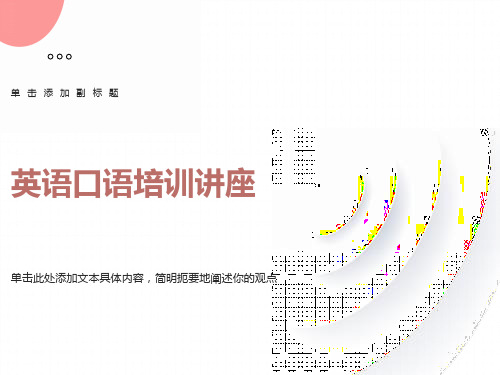
Dialogue 4 A: Have a nice weekend! B: Thanks. You too!. A: Do you have any plans? B: Another day, another dollar. (和往常一样)
汇报日期
01
02
03
你认识……?
Do you know……
2
It’s been lovely to see you again.
3
Look forward to seeing you again.
4
祝你万事如意
All the best.
Best wishes.
Regards to your parents.
4
Send your parents my best.
Are you leaving for Guangzhou soon?
I guess so. Perhaps next Monday.
Dialogue 2 How are you getting along? I haven’t seen much of you lately. Keeping busy. Doing what? I am supposes to give you my oral defense(答辩) tomorrow. A: Well, keeping busy before oral defense is all in day’s work. be all in day’s work:不足为奇,司空见惯
汇报日期
感谢您的观看
Dialogue 2 A: I must run along now. I’ve enjoyed this evening very much. B: It was a pleasure having you. A: Every success with your research project. I hope it goes well. B: Thank. Take care then.
英语情景对话PPT 精品 PPT课件

Xiaoming:Oh,no. Xiaomei:what’s wrong,Xiaoming?
Xiaoming:I’m worried about the next month’s exam ...
Xiaomei:Because you’re not trying to study hard!
Xiaoming:So what shoud Ido? Xiaomei:You shoud make good study habits.First,
Mom:The early bird gets the worm。 Xiaoming:I know. I know. But I don’t want any worms。
Act 2ຫໍສະໝຸດ Time:15:20p.m. Place:Classroom People:
Xiaoming Xiaomei
Act 2
Thank you !
常听见这样的感叹:要是当初2018年 中国大 学毕业 生薪酬 排行榜 通过对 280多 万以及 多届毕 业生调 研后, 计算出 了各高 校毕业 生的薪 酬状况 。 虽然我们都知道名校毕业生的收入会普 遍比较 高,但 这份榜 单告诉 我们, 清华北 大毕业 生的月 薪,平 均近万 ,而普 通院校 的只有 两三千 。
make a plan for your study;second,make full use of the time in the class;Thirdly, critical study is also very important. Xiaoming:So kind you are.Thank you!
Good life Good habits -Life theatre 一生活剧场
《Welcome-back-to-school对话》对话PPT课件2

B Let’s learn & talk
he
she
she
he
“he” or “she”?
______ is Chen Jie.
“he” or “she”?
______ is Mike.
Match(连线)
he
she
teacher
student pupilThis is __A_m__y____. She is a new __s_t_u_d_e_n_t______.
She’s from ____t_h_e__U_K______.
Where are you from? I’m from _____________
Look , ask and answer
The woman is a ____________. The girl is a _____________.
Look and match
teacher
student (pupil)
This is __M_i_ss_W__h_it_e_. She is a __t_e_a_c_h_e_r___.
16、在不违背原则的情况下,对别人要宽容,能帮就帮,千万不要把人逼绝了,给人留条后路,懂得从内心欣赏别人,虽然这很多时候很难 。
17、做不了决定的时候,让时间帮你决定。如果还是无法决定,做了再说。宁愿犯错,不留遗憾! 18、不要太高估自己在集体中的力量,因为当你选择离开时,就会发现即使没有你,太阳照常升起。 19、时间不仅让你看透别人,也让你认清自己。很多时候,就是在跌跌拌拌中,我们学会了生活。 20、命运要你成长的时候,总会安排一些让你不顺心的人或事刺激你。 21、你的假装努力,欺骗的只有你自己,永远不要用战术上的勤奋,来掩饰战略上的懒惰。 22、成长是一场和自己的比赛,不要担心别人会做得比你好,你只需要每天都做得比前一天好就可以了。 23、你没那么多观众,别那么累。做一个简单的人,踏实而务实。不沉溺幻想,更不庸人自扰。 24、奋斗的路上,时间总是过得很快,目前的困难和麻烦是很多,但是只要不忘初心,脚踏实地一步一步的朝着目标前进,最后的结局交给 时间来定夺。
英语情景口语课件ppt
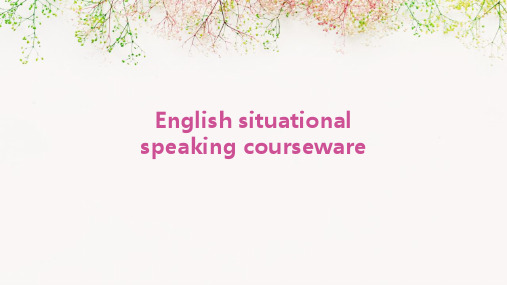
At the hospital
• Detailed description
• Registration: Learners should know how to register, such as "I need to register as a patient, please.". • Consultation: During a doctor's consultation, learners should learn to describe their condition, such as "I have
Ticket purchase: Learners should learn how to purchase tickets, such as "I would like to book a roundtrip ticket from New York to Los Angeles, please.".
Check in: When checking in, learners should understand how to register their check-in information, such as "My name is John Smith and I reserved a room for three nights.".
Withdrawal: Learners should learn how to withdraw from an account, such as "I would like to withdraw $200 from my checking account.".
Deposit: Learners should know how to deposit cash into their account, such as "I would like to deposit these checks into my account.".
英语日常交际用语(对话16页)ppt课件
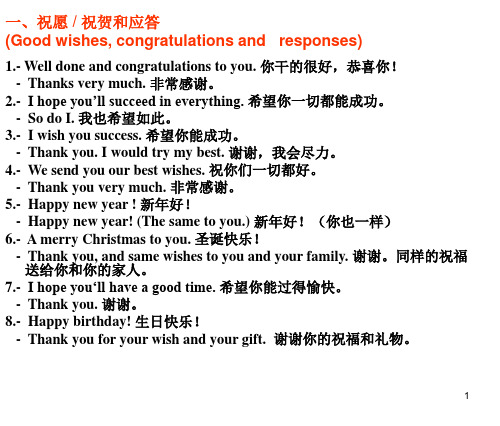
6.- A merry Christmas to you. 圣诞快乐! - Thank you, and same wishes to you and your family. 谢谢。同样的祝福 送给你和你的家人。
4.- I‘m sorry. I lost the key to your bike. 对不起,我把你的车钥匙丢了。 - It doesn‘t matter. I still have one copy at home. 没关系,我家里还有一 套。
5.- Sorry to have kept you waiting for a long time. 不好意思让你等这么长 时间。
2.- Oh, I am so sorry to interrupt your study. 哦,很抱歉打扰你的学习。 - That‘s quite all right. What could I do for you? 没问题,有什么事吗?
3.- I‘m sorry to give you so much trouble. 不好意思给你添这么多麻烦。 - No trouble at all. 不麻烦。
顾好自己,别让自己太忙了。 - Yes, I will. Thanks. 好的,我会的。谢谢你。 5.- The museum is very far from here. Let‘ catch a bus, shall we? 博物馆离这
里太远了,我们坐汽车去,好吗? - OK. Let’s catch a bus. 好的,我们坐汽车吧。 6.- You must remember the saying: Whatever you do, do it well. 你要记住一
英语情景交际课件(公开课)ppt

• —I wonder if I could use your telephone. • —________. (1996 A. I wonder how B. I don’t wonder C. Sorry, it’s out of order D. No wonder, here it is 上海27) 上海 )
• —Do you think it’s going to rain over the weekend? • —_______________.(NMET ’94,13) . ) A.I don’t believe B.I don’t believe it C.I believe not so D.I believe not I
2.---Thank you for your help. --- 1>.____________________. That’s all right 2>.____________________. Not at all 3>.____________________. You are welcome 4>.____________________. Don’t mention it 5>.____________________. It’s a pleasure ____________________. It’s my pleasure ____________________. My pleasure
21.----Your cell-phone is really beautiful. Thank you for saying ---- ________________________. so 22. ----Mr. Black this is our language lab. Would you like to go in and have a look? After you. ----_______________ A. help you self B. This way, please C. Follow me D. After you
商务英语口语ppt课件
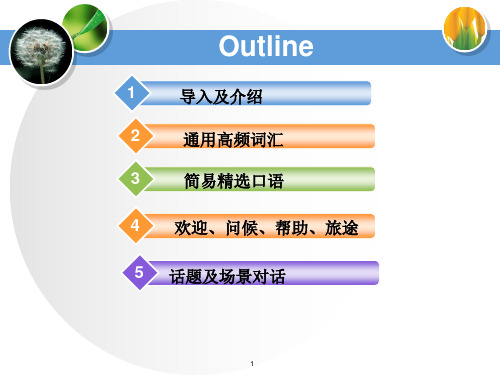
高频通用词汇
❖ Director 厂长、主任、所长、部长 ❖ Division manager 科长 ❖ Chief engineer 总工程师、轮机长[,endʒi'niə] ❖ Engineer 工程师 ❖ Technician 技术员[tek'niʃən] ❖ Head of group 组长 ❖ Foreman 工长、领班['fɔ:mən] ❖ Inspector 检验员[in'spektə] ❖ 领读5遍,选一列学员依次读。要求学员课下背下单词。
❖ The girl was moved, but somebody told her “don’t forget HIJK!” “He is just kidding.”
❖ The girl responded: It doesn’t matter whether he lied to me. There is “LMNOP”. Love must need our patience.
25
Greetings
❖遇到熟人
▪ Haven’t seen you for ages/some time. 太久不见了。 ▪ How have you been(doing)? 最近怎么样? ▪ Hey, man. How’s it going? ▪ How are you getting on/making out?
❖ Would you mind me opening the window? 你介意我开窗 户吗?
❖
标识英语
11
Dialogue1 初次见面
场景一:Edward船东来涂装厂房看船体喷涂进度。
❖ A:Are you Edward Green? 你是Edward Green 先生么? ❖ B: Yes,I am. 是的。 ❖ A: How do you do? I’m Yuanfei Chen, foreman of painting center.
英语口语课PPT课件

• Hello,Jim. • Hi,Jarr y. • Long time no see. • Yes, long time no see. I miss you. • I miss you, too. • Nice to meet you. • Nice to meet you,too.
Hello.
What’s your
Hi, Lucy. I’m Rebecca. Hi, Rebecca.
Nice to meet you.
Nice to meet you, too.
(Long time no see.
I miss you.)
第15页/共23页
第17页/共23页
问路的表达。
第18页/共23页
Let's sing and dance.
让我们边唱边跳吧。
第19页/共23页
left left right right go turn around go go go left right left left right right left left right right go go go left left right right go turn around go go go
第1页/共23页
早上好,女士们、先生们 Good morning,
ladies and
gentlemen.
第2页/共23页
好久不见.
第3页/共23页
第4页/共23页
第5页/共23页
Conversations 情景对话
第6页/共23页
• 你好,Jim. • 你好,Jarr y. • 好久不见。 • 是啊,好久不见。我很想你。 • 我也很想你。 • 见到你很开心。 • 见到你也很开心。
英语口语情景对话ppt课件

• 该起床了! It's time to get up! (该起床了!) I don't wanna get up. (我真不想起。) It's time to wake up! It's time to get out of bed. It's time to get ready.
10
• 睡得好吗? Did you sleep well?
• 回答: Fine, thank you. Pretty good.
• Not so good/great. *用于身体状况不好或是有
其他什么不好的事时。
• Nothing much. Nothing special
3
• Glad to meet you. *用于初次见面。 I'm glad to meet you. Nice to meet you. It's great meeting you.
1
见面、分手时
• 碰到友人 Hi! (比Hello随便,用于比较熟悉的人,男女都可
以用)
Hi! (嗨!) Hi! (嗨!你好!) • 你好吗? How are you? (最常用的问候方式。除了有问
候对方“你好吗”的意思外,还含有“午安”在 内的意思。 )
2
• How's it going? How're you doing? *语气较随便。
• Are you gaining weight?/Have you gained weight? (最近你是不是胖了?) I'm afraid so. (好像是吧。) Are you getting fatter? *不礼貌的说法。 Are you losing weight? (最近你是不是瘦了?)
英语情景对话公开课ppt课件
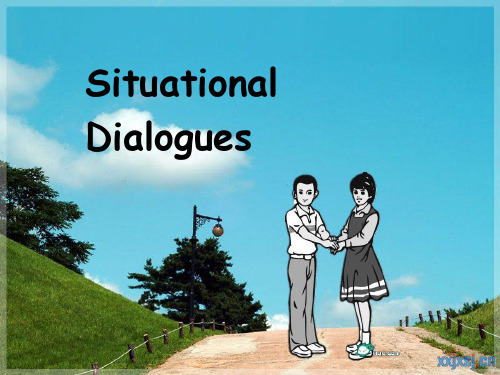
Tom: I have only 120 yuan.__________6G_______________
The shop assistant: Ok. It’s for your mother. Here you are. Tom: Here is the money. Thanks.
for helping me with my forgetting to bring
English.
your books.
1.--You _a_r_e_ _w_e_l_c_o_m_e_. 1.--It d__o_es_n_’_t_ _m_a_t_t_e_r.
2.--That’s __a_ll__ __r_ig_h_t_. 2.--That’s __a_l_l ___
.
(1)—I’d like to invite you to dinner this
Saturday, Mr. Smith.
—
.
A. Oh, no. Let’s not.
B. I’m very sorry, but I have other plans.
C. I’d rather stay at home.
C.Hello. Have you had your supper?
D.Hi! Going to dinner..
( 3 )—Thanks so much for the book you sent me.
The shop assistant: __________3H_Байду номын сангаас____________
Tom: The red one.
The shop assistant: Sorry.________4C_______. Look at this coat. Tom: It looks nice.__________5F_K_______________
口语考试情景对话ppt课件

ppt精选版
17
对话18:我一般早上六点起床,早 饭吃面包,喝牛奶。
1.What time do you get up? 2.I usually get up at 6 o'clock. 2. What do you have for breakfast? I usually eat some bread and drink
home.
ppt精选版
23
对话23:我经常饭后散步,它有
利于健康。
1.What do you usually do after
supper?
2.I usually go out for a walk after
supper.
2.What benefits can it bring for
you?
3.It’s good for mpypt精选h版ealth.
1.Which class and which grade are
you in?
2.I'm in Class Two, Grade Three.
2.Where do you live?
3. I live in the Ninth Street near the
school.
ppt精选版
13
对话14:单词“panda”的意思是“中国 四川一种吃竹子的动物”。 1. How many letters are there in the word 'panda'? There are five letters in the word ‘panda’.
英语情景对话专项课件PEP

(pep)2023-10-27contents •课程介绍•情景对话技巧•情景对话实践•情景对话案例分析•学生实践与评估•教学建议与展望目录01课程介绍国家英语教育政策背景随着全球化的进程,英语在日常生活和工作中的重要性日益凸显。
为了提高中小学生的英语口语能力,国家出台了相关英语教育政策,强调英语听说读写能力并重,而情景对话是提高口语表达能力的重要途径。
课程背景学生现状在现实生活中,许多学生虽然学习了多年英语,但在实际场景中却无法流畅地运用英语进行交流。
他们的英语口语能力与实际需求存在较大差距。
课程目的英语情景对话专项课件旨在帮助学生弥补上述缺陷,通过模拟真实场景的对话练习,提高学生的英语口语表达能力。
使学生掌握常用的日常生活用语,包括问候、介绍、购物、交通等场景。
课程目标知识与技能通过多媒体教学、角色扮演、互动练习等多种教学方法,培养学生的口语表达能力,提高他们的口语水平。
过程与方法增强学生的自信心,让他们敢于开口说英语,享受说英语的乐趣。
同时培养学生的合作精神,提高他们的跨文化交流意识。
情感态度价值观课程内容对话场景01涵盖问候、介绍、购物、交通等多个日常生活场景,确保学生能够在各种实际场景中运用所学知识进行交流。
对话内容02包括对话的文字材料、配套音频、视频资料等,为学生提供丰富的学习资源。
练习与活动03设计多种形式的练习题目和活动,如填空、选择、对话练习等,以加深学生对对话内容的理解和记忆。
同时组织角色扮演、小组讨论等活动,提高学生的口语应用能力。
02情景对话技巧在听对话时,要学会识别关键词,这些关键词可以帮助你理解对话的主题和内容。
识别关键词注意语音语调把握节奏和连词语音语调可以传递出说话者的情感和态度,理解这些可以帮助你更好地理解对话。
对话中的节奏和连词可以帮助你理解对话的进展和逻辑。
030201在表达自己的观点时,要尽量把话说清楚,避免使用过于复杂的词汇和句子。
表达清晰在对话中,提问是一个重要的技巧,通过提问可以获取更多信息,同时也可以表达自己的疑惑。
- 1、下载文档前请自行甄别文档内容的完整性,平台不提供额外的编辑、内容补充、找答案等附加服务。
- 2、"仅部分预览"的文档,不可在线预览部分如存在完整性等问题,可反馈申请退款(可完整预览的文档不适用该条件!)。
- 3、如文档侵犯您的权益,请联系客服反馈,我们会尽快为您处理(人工客服工作时间:9:00-18:30)。
• Not so good/great. *用于身体状况不好或是有
其他什么不好的事时。
• Nothing much. Nothing special
• Glad to meet you. *用于初次见面。 I'm glad to meet you. Nice to meet you. It's great meeting you.
• 该起床了! It's time to get up! (该起床了!) I don't wanna get up. (我真不想起。) It's time to wake up!
It's time to get out of bed.
It's time to get ready.
• 睡得好吗? Did you sleep well?
• I'm going to cram school now. *cram意为 “填鸭式补习”。 Call when you finish. (下课后来个电话。)
• I'm tired. I'm exhausted. (我精疲力尽了) I'm pooped. (俚语 )
英语口语情景对话
外语爱好者协会
见面、分时
• 碰到友人 Hi! (比Hello随便,用于比较熟悉的人,男女都可
以用)
Hi! (嗨!) Hi! (嗨!你好!) • 你好吗? How are you? (最常用的问候方式。除了有问
候对方“你好吗”的意思外,还含有“午安”在 内的意思。 )
• How's it going? How're you doing? *语气较随便。
• How's your family? How's your family? (你的家人怎么样?) Everyone's fine. (大家都很好。)
• 好久没见了。 Long time no see. *比较随便的说法。对方一般回 答Yeah, how have you been?/Yeah, too long.
Which dress should I wear?
Which one should I wear?
What should I put on?
• I'm late! (我晚了!) Hurry up! (快点儿吧!) 我得赶紧走! I have to rush! I have to hurry (up)! I have to get going! I have to get moving.
分手时
• Goodbye. *分手时最常用的寒暄用语。 • Goodbye. Take care! (再见,保重啊!)
Bye. *比Goodbye的说法随便。 • See you later.
See you soon. • 我去了啊。
I'm off now. *off “去,走开”。 I'm leaving.
• Yes, I slept very well. Did you sleep well?
• No, I couldn't fall asleep. (哪儿啊,几乎没 睡着。)
• Are you feeling sick? (你不舒服吗?) No, I'm just tired.
你终于起来了。
You finally got up. I'm still sleepy. (我还困着呢!)
I haven't seen you for a long time.
I haven't seen you for ages.
• Are you gaining weight?/Have you gained weight? (最近你是不是胖了?) I'm afraid so. (好像是吧。) Are you getting fatter? *不礼貌的说法。 Are you losing weight? (最近你是不是瘦了?)
从回家到就寝
• I‘m home/ back. (我回来了。) Welcome home/ back! Did you have a good time? 今天怎么样? How did it go today? How was your day?
• I'm hungry. (我饿了。) We have some snacks. (吃点儿点心吧。)
• Good luck! *在对某人去旅行或去做一件比 较难的事情时使用。
• Thanks. I need it. (谢谢,借你吉言。)
• I wish you good luck. Have a nice day! (祝你愉快!) Same to you. (也祝你愉快!)
从起床到出门
早晨好! Good morning, John. Good morning, mom. 闹钟响了吗? Did the alarm clock go off? (go off是闹钟“ 响”的意思。) Did the alarm clock buzz? Did the alarm clock ring?
• I have to go. (我得告辞了。) Can't you stay a little longer? (再呆会儿吧
!) Take care of yourself. (你自己多保重!) Don't worry about me. (别担心我!) I'll come back later. (不久我就会回来的。) I'll stop by later. (我会顺便来的。)
今天是个好天! It's a nice day! It sure is. (是不错啊。) It's a beautiful day! It's a wonderful day! It's a great day!
• Did you brush your teeth?
Have you brushed your teeth? I have to comb my hair. (我得梳梳头了) 穿什么好呢? What should I wear? (穿什么好呢?) The red one. (穿红的吧!)
